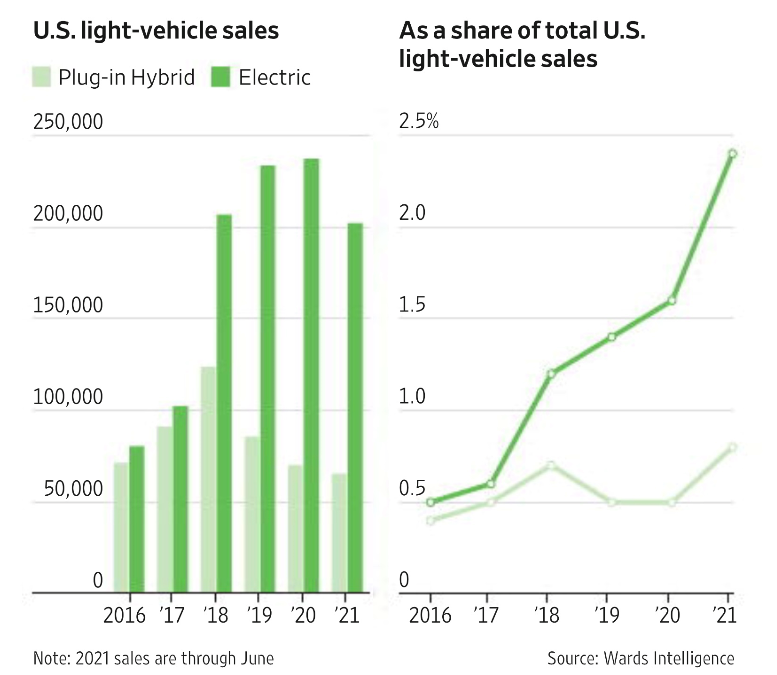Sales of electric vehicles are exploding in the U.S.; Wards Intelligence estimates that sales more than doubled in the first half of 2021 versus the year-ago period. Electric vehicles (EVs) represented more than 3% of all U.S. unit sales in May and June, the highest percentage on record.
Against this backdrop, General Motors Company (NYSE: GM) is unfortunately making almost the only mistake that could blunt the growth of EV sales in the world’s most prosperous country: producing a flawed, potentially unsafe vehicle. On July 23, the company announced it is recalling, for the second time, 69,000 all-electric Chevrolet Bolt models (model years 2017-2019) because of a potential battery defect that can cause a fire. The Bolt is the only EV model that GM presently sells in North America, although at least one other model is scheduled to begin selling here in 2022.

GM has determined, after researching at least nine Bolt fires in the U.S. since early 2020, that manufacturing defects in the battery could cause the car to catch fire when it is parked. GM has not yet determined a comprehensive repair solution. South Korea-based LG Group manufactures the lithium-ion battery used in the Bolt.
Until a fix is determined, 2017-2019 Bolt owners should: 1) charge their vehicles only to 90% of capacity; 2) utilize them over a range of less than 70 miles; and 3) park them outside after charging.
In November 2020, GM issued a recall for the same 2017-2019 Bolt models so that a software update could be installed. The revised software would monitor the condition of the car’s battery. Sometime after receiving the software update, at least one vehicle had a battery fire.
Several Other EV Manufacturers Have Been Forced to Implement Recalls as Well
GM is not alone in being forced to recall some of its EV models. Over the last twelve months, at least three other manufacturers have issued recalls on their models, two over battery issues. Hyundai incurred nearly US$1 billion in related costs, an extremely high recall cost, to replace the batteries in two of their EV models.
| Model | Date of Recall | Number of Cars Recalled | Issue | |
| FORD | Ford Mustang Mach-E | Mar-21 | 1,258 | Subframe bolts did not meet specifications. |
| HYUNDAI | Ioniq EV Elec City | Feb-21 | 82,000 | Hyundai replaced batteries after reports of 15 fires involving these vehicles. Recall cost Hyundai an average of US$11,000 per vehicle, a very large sum. |
| BMW | 530e, xDrive30e, Mini Cooper Countryman All4 SE, BMW i8, BMW 330e, 2021 BMW 745Le xDrive, 2021 BMW X5 xDrive45e models | Oct-20 | 4,509 | Welding debris left inside battery pack could create a short circuit between battery modules. |
| GM | Chevrolet Bolt | Nov-20 | 69,000 | Software update on battery. |
| GM | Chevrolet Bolt | Jul-21 | 69,000 | Potential battery defect that can cause a fire. |
GM Plans to Be a Major EV Player
GM plans to invest aggressively to produce EVs. It has announced a framework to spend US$35 billion over the next four years to develop 30 new electric models. The company intends to sell only electric vehicles by the year 2035.
This significant spending is likely necessary to keep up with the EV investments of most global automakers. Alix Partners LLP, a well-known global consulting firm, notes that global vehicle manufacturers have announced plans to spend a cumulative US$330 billion to develop and sell electric cars over the next five years.
General Motors Company last traded at US$54.94 on the NYSE.
Information for this briefing was found via Sedar and the companies mentioned. The author has no securities or affiliations related to this organization. Not a recommendation to buy or sell. Always do additional research and consult a professional before purchasing a security. The author holds no licenses.









